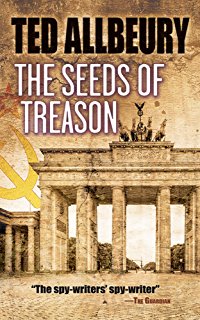Madonna in a Fur Coat by Sabahattin Ali
 Friday, December 22, 2017 at 7:49AM
Friday, December 22, 2017 at 7:49AM 
First published in Turkey in 1943; published in translation in Great Britain in 2016; published by Other Press on November 7, 2017
The initial narrator of Madonna in a Fur Coat is newly employed in a Turkish firm when he meets Raif Efendi, who translates the firm’s documents from Turkish to German. Raif responds to hostility and derision with “unwavering serenity” and calculated isolation. His children and siblings show him little respect because his earnings are meager. Raif responds as if disdain is his due.
From his sickbed, Raif asks the narrator to destroy a notebook that Raif has been keeping since 1933. The narrator persuades Raif to allow him to read the notebook before chucking it into the stove. The theme of the tragic love story that Raif tells in the notebook has to do with the cruelness of fate, the burden we share of accepting the accidents of life that are thrust upon us.
Raif’s story takes him as a boy from a Turkish village to Berlin, where his father has sent him to learn how to make soap. He has little ambition but loves to read. Learning German opens a world of literature that had never been translated into Turkish. Visiting an art exhibition, he is taken by the modernistic self-portrait by Maria Puder of a woman in a fur coat.
Naturally, Raif’s notebook tells the story of meeting the artist and their odd friendship — odd because Maria hates men, hates their arrogant pride and entitlement, and conditions her friendship with Raif on never being asked for anything. But Maria senses an innocence in Raif. He seems like a little girl (a judgment that Raif’s father also bestowed, to Raif’s consternation), and is thus the kind of man she might befriend.
Raif, who has always “shied away from human company, never sharing my thoughts with a soul,” feels overwhelmed by his unspent passion for Maria. His conviction that life has no meaning is suddenly challenged by the meaning he finds in his chaste encounters with Maria as he experiences the thrill of finally being understood. Yet Maria believes that solitude is the essence of life, that “all unions are based on falsehood,” that we construct the partner or friend we want rather than seeing them in their reality, and then flee when the reality replaces the construct. For all their similarities, Raif and Maria have different opinions about love that place a barrier between them.
While the novel describes Raif’s evolving feelings, its focus is on Raif’s philosophy of life. Raif believes that no woman has ever loved him and none ever will because women are incapable of true love. “Instead, they ached for the unattainable — the opportunities missed, the salve that their broken hearts longed for — thereby mistaking their yearnings for love.” But Raif’s peceptions and beliefs change often, sometimes daily, sometimes hourly. Change is Raif’s only constant despite his puzzlement with Maria, who makes a virtue of her inconsistency, telling Raif “that’s just the way I am … one day like this, another day like that.” At the same time, the story is about a man who understands the inevitably of change but is incapable of coping with it, a man whose will to believe in himself is irreparably broken.
As the novel moves to its conclusion, it becomes a story of tragic fate, and it is Raif’s reaction to his fate that defines the rest of his existence. Rather than spoiling the story by revealing its details (the resolution has elements of a soap opera), I’ll highlight some of Sabahattin Ali’s quotable prose:
“Nothing grieves me more than seeing someone who has given up on the world being forced to smile.”
“But isn’t this how souls come together, by holding another’s every idea to be true and making it their own?”
“How painful it is, after thinking that a woman has given us everything, to see that in truth she has given us nothing — to see that instead of having drawn her closer, she is farther away than ever!”
“The logic in our minds has always been at odds with the logic of life.”
“For a brief while, a woman had pulled me out of listless lethargy; she had taught me that I was a man, or rather, a human being; she had shown me that the world was not as absurd as I had previously thought and that I had the capacity for joy.”
Although set in Turkey and Berlin, the story has no boundaries. Its themes are relevant to any time or culture. I might not recommend the story for its plot, but its insight into human nature, its exceptional characterization, and its elegant prose make the novel a standout tragedy.
RECOMMENDED


